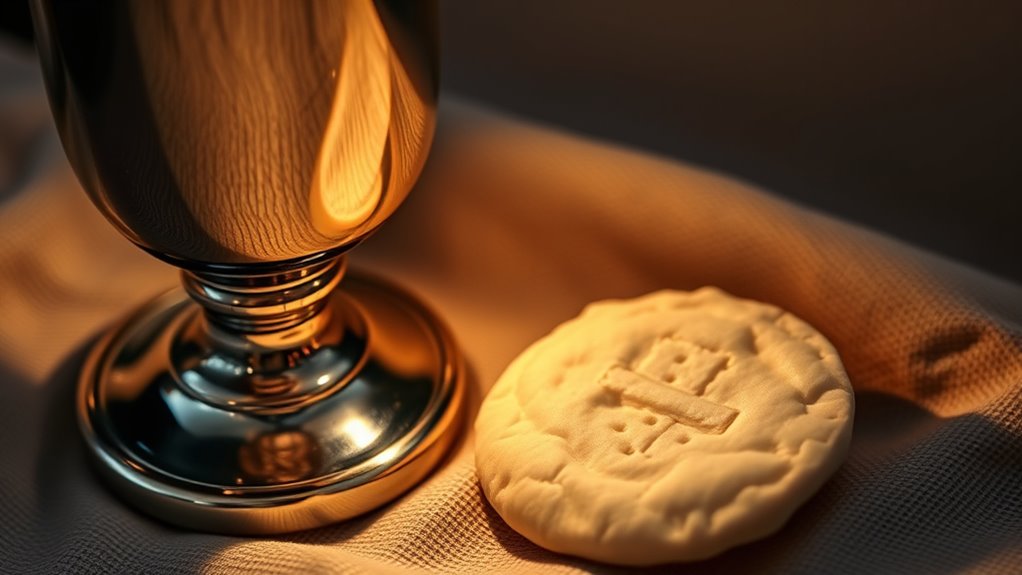Communion, also called the Lord’s Supper, is a sacred act where you share bread and wine to remember Jesus’ sacrifice. The bread symbolizes His body, broken for you, while the wine represents His blood shed for forgiveness. It’s more than a ritual; it’s a meaningful way to reflect on His teachings and unite with fellow believers. Understanding its deep symbolism can enrich your spiritual experience—if you explore further, you’ll discover even more significance behind this ancient tradition.
Key Takeaways
- Communion, also called the Lord’s Supper, is a sacred Christian ritual symbolizing Jesus’ sacrifice through bread and wine.
- It unites believers in faith, remembrance, and spiritual connection, emphasizing community and shared devotion.
- The bread represents Christ’s body, and the wine signifies His blood shed for forgiveness.
- It serves as a moment of reflection on Jesus’ teachings, death, and resurrection, fostering renewal and humility.
- As an act of grace, communion brings divine presence, comfort, and reinforces faith and reconciliation among believers.

Have you ever wondered what communion truly means? At its core, communion is a sacred act that brings believers together in a shared spiritual experience. It’s more than just a ritual; it’s a profound expression of faith, unity, and remembrance. When you participate in the Lord’s Supper, you’re engaging in a tradition that dates back centuries, rooted in biblical teachings. But what makes this act so meaningful isn’t just the act itself—it’s the symbolism and significance behind it. Understanding these elements can deepen your appreciation and connection during the communion.
Communion is a sacred act uniting believers in faith, remembrance, and spiritual connection through meaningful symbolism.
The symbolism of communion is rich and layered. The bread and wine (or grape juice) aren’t just physical elements; they serve as powerful symbols representing deeper spiritual truths. The bread symbolizes Christ’s body, which was broken for humanity, reminding you of His sacrifice. The wine signifies His blood, shed for the forgiveness of sins. These symbols serve to connect you personally to Christ’s suffering and love, turning an ordinary meal into a profound act of worship. Recognizing this symbolism heightens your awareness of Jesus’ sacrifice and invites you to reflect on His role in your life. Additionally, many Christian traditions emphasize that partaking in communion can also be a moment of spiritual renewal, strengthening your faith and relationship with God.
The significance of communion extends beyond symbolism. It’s a act of remembrance, calling you to recall Jesus’ last supper with His disciples. It’s a time to reflect on His teachings, His death, and His resurrection. When you partake, you’re affirming your faith and reaffirming your commitment to follow His example. It’s also a moment of unity with fellow believers—an acknowledgment that you are part of a larger spiritual family. Sharing communion fosters community, reminding you that faith isn’t just a personal journey but a collective experience that binds believers together across time and space.
Furthermore, communion holds a spiritual significance as a means of grace. For many, it’s not just symbolic but a conduit for divine presence and blessing. Participating in the Lord’s Supper can bring comfort, renewal, and a sense of closeness to God. It’s a sacred moment where Heaven meets Earth, offering you an opportunity for introspection and spiritual growth. This act encourages humility and gratitude, helping you recognize the depth of God’s love and the importance of forgiveness and reconciliation.
In essence, communion is a meaningful act filled with symbolism and significance. It’s a ritual that invites you to remember, reflect, and renew your faith. By understanding its deeper meaning, you can approach it with greater reverence and intentionality, making each participation a truly transformative experience.
Frequently Asked Questions
Can Non-Christians Participate in Communion?
Non-Christian participation in communion varies based on interfaith perspectives. Many Christian communities encourage only believers to partake, emphasizing its spiritual significance. However, some churches welcome non-Christian participation as a gesture of unity and respect. You should verify with the specific church’s guidelines and practices, as attitudes toward non-Christian participation differ widely. Respecting each community’s traditions ensures you approach communion thoughtfully and appropriately within diverse faith contexts.
How Often Should Believers Partake in the Lord’s Supper?
Think of the Lord’s Supper as your spiritual nourishment, like a daily meal for your soul. Most church traditions suggest partaking regularly, often weekly or monthly, to stay connected with Christ’s sacrifice. This frequency helps you deepen your faith, reflect on His love, and stay spiritually energized. You should participate as often as your church recommends, ensuring your heart remains receptive and your faith stays vibrant.
What Are the Different Denominational Views on Communion?
You’ll find that different denominations hold varied views on communion’s Eucharist symbolism and doctrines. Catholics believe in transubstantiation, where bread and wine become Christ’s body and blood. Protestants may see it as symbolic remembrance, while Orthodox churches emphasize the mystery of the Eucharist. These denominational doctrines influence how believers understand and participate in communion, shaping their spiritual experience and theological outlooks around this sacred practice.
Is Communion Necessary for Salvation?
You don’t necessarily need communion for salvation, but it holds deep spiritual significance and theological implications. Participating in the Lord’s Supper can strengthen your faith, remind you of Christ’s sacrifice, and foster community. While it’s not a requirement for salvation, many believe it’s an important act of obedience that deepens your relationship with God and highlights the grace extended through Christ’s sacrifice.
How Is Communion Celebrated in Different Cultures?
You’ll notice that different cultures celebrate communion through various traditional practices and cultural rituals. In many Western churches, you might share bread and wine symbolizing Christ’s body and blood, while in other regions, like Africa or Asia, communities incorporate local foods and unique ceremonies. These diverse expressions reflect each culture’s faith and history, making communion a meaningful act of spiritual unity across the world’s many traditions.
Conclusion
So, next time you partake in communion, remember it’s more than just a ritual—it’s a meaningful reminder of connection and grace. It’s funny how, in a way, sharing bread and wine brings us closer to each other and to God, almost like a divine coincidence. These moments of unity can unexpectedly remind you of the love and hope that bind us all together, making each communion truly special and personal.










